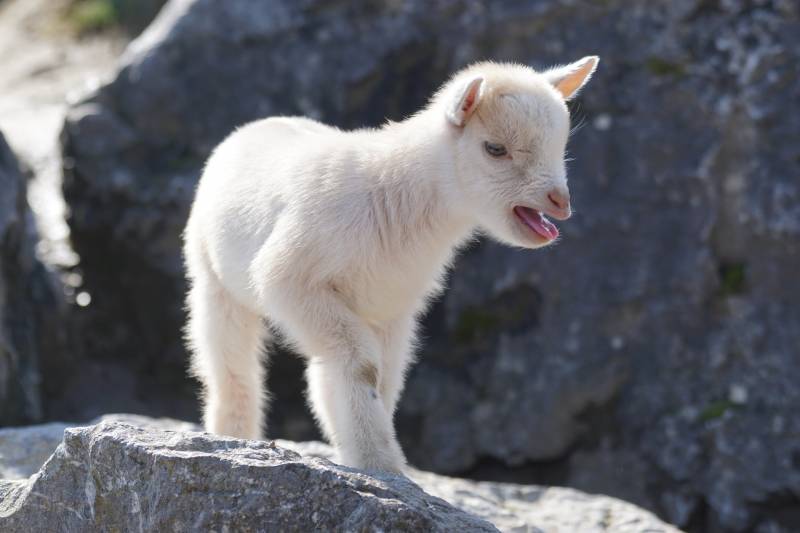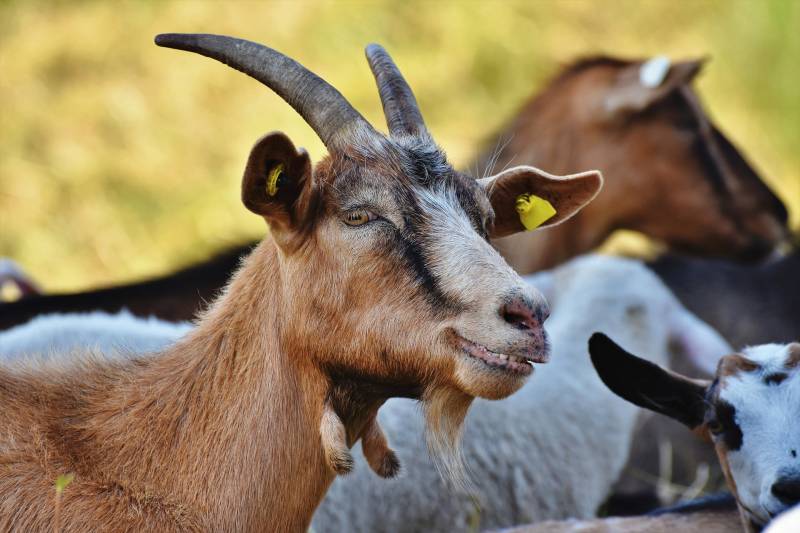Quick Navigation
Goats have been domesticated as farm animals or livestock for more than 10,000 years.
They have been famous to humans as they provided us with meat, milk, skin, and pelts.
Domesticating goats has always been a rewarding adventure.

Goats are docile, affectionate, and easy to manage.
If you own a goat or buck (male), chances are you’ll always hear them scream or yell.
Being a herd animal, goats are social creatures who have plenty to say all the time.
In this article, we’ll explain why your goat might be screaming and trying to communicate with your or other herd fellows.
Reason Goats Scream
Being a highly vocal and social animal, goats have pretty decent cognitive skills.
These social, gentle-looking goats can sometimes go from calm, easy-to-tame animals to mischievous and screaming animals.
Occasionally, you might hear your sturdy goat making complaints while screaming or yelling.
The goat scream or sound is known as a “calling sound” or “bleating”.
The most common goat calling or screaming is the contact call.
These screams or bleatings are used to maintain contact with other herd fellows at a relatively close distance.
Goats are incredibly social and vocal animals.
You might occasionally witness them murmuring even while sleeping.
Understanding their screams or bleats isn’t difficult for the guardians.
Your goat might scream or bleat if she is in isolation, frustrated (food-related), anticipating food, about to give birth, or in heat.
In Isolation, Away From Other Fellows
Goats are herd animals and like to communicate with their fellow goats.
When goats stay in isolation away from other fellows, they scream or yell.
According to Martin L. Lenhardt, faculty staff of Biocommunication Section, Department of Otology, Rhinology and Laryngology, Virginia Commonwealth University, Richmond, U.S.A, goats produce two types of screams or calls in isolation.
The first type of scream or call in isolation is a “contact call”.
This is used to maintain contact with other herd fellows.
These calls are indications of the stress level of goats.
They call when they’re physically but not vocally separated from each other.
Another type of scream can be “distress calls”.
These calls are high-pitched and show high-stress levels.
When goats are partially separated, physically but not vocally separated from each other, the goat screams or calls while jumping.
Goats scream in partial isolation to show their other fellow the distress associated with isolation.
In complete isolation, goats usually stay less active and produce short calls.
In total isolation, goats get more stressed and remain lazed.
Goats also scream or bleat when expecting the food to be delivered.
For instance, if you give food to your goats at a particular time of the day.
Your goats will scream or call you to show their anticipation, that’s how intelligent they are as they know when is their feeding time.
This is their way of showing their joy and appreciation.
Another reason for their screams or high bleats can be frustration.
When you don’t provide them with enough food or food on time, goats might scream to remind you of their hunger.
Being highly vocal and social animals, goats have sophisticated cognitive skills.

According to Juliane Kaminski from The University of Portsmouth, United Kingdom, goats can perspective-taking.
Goats use behavioral or vocal expressions to regulate social interactions within a herd.
They communicate with humans or herd fellows with their cognitive abilities.
Since these animals are social, chatty, and expressive, and, therefore, they show their frustrations to you by screaming or producing high bleats.
So if you hear your goats screaming, check if they need extra food or something.
In Heat
When in heat, even a calm, silent goat can get really loud.
Similar to other animals, being in heath will alter goat moods.
Doe, female goats scream a lot. When in heat, Nubians example, who are noisier than most other breeds, may literally scream especially if no buck (or male goat) is present.
When in heat, different goats produce a variety of sounds. Some screams (high bleats), some moan loudly, while others may bleat softly.
Similar to female goats, males will scream too.
As the bucks face hormonal changes, they might become a little aggressive.
Their screams can be recognized as “wup-wup-wup”.
Male goats (buck) also scream, known as “buck screams” while stomping a foreleg when they court female goats.
Bucks will also yell a lot when penned away from goats in heat.
The volume and pitch of the scream or bleat correlate to the goats’ level of arousal.
Before And After Giving Birth
Pregnant goats scream as well.
Pregnant goats may start murmuring to their unborn babies in soft, sweet, and low bleats.
This usually happens a day or a few hours before the parturition.
Mama goats continue this murmuring even after giving birth.
They continue to murmur to their newborn babies.
Baby goats start bubbling or mewling soon after their birth.
Mama goats recognize their babies by sight and sound.
The mother goats reacted with greater intensity when they hear their offspring’s voices than when they heard the offspring in the neighborhood.
Elodie F. Briefer from the Biological and Experimental Psychology Group, School of Biological and Chemical Sciences, Queen Mary University of London, United Kingdom, found in her research article that mama goats can remember the voice of their babies up to 13 months of separation.
You’ll commonly witness young goats calling (screaming) their mothers and mothers calling their babies.
Young goats will also scream when suddenly someone picks them up.
They’ll also scream if you’ll separate them from their parents and other herd mates.
Young goats also give contact calls ( screams) when calling their siblings.
Conclusion
Goats aren’t only smart, submissive, and affectionate but are also chatty animals with a variety of low or high-pitched sounds.
To accommodate your goats, it is highly significant for you to understand the reason behind their screaming (bleating).
Pay attention to their screams and try to understand what they need.
Their screams are familiar sounds to owners over time.
Hopefully, next time when your goats scream, you will be able to understand their calls or bleatings.

Purrfect n’ Pawesome is the brainchild of Amanda, who has been into researching and writing about pets to help other pet parents in nurturing their adorable pets. Currently, she runs Purrfect n’ Pawesome along with her team of experienced and dedicated pet experts. Along with being an awesome writer and entrepreneur, Amanda is a cat mom to two innocently spoiled cats, Balanca and Scruffy.
She has been writing about pet care and nurturing and wants to share her readers’ experiences, learnings, and knowledge.
Over the years, she had the opportunity to work with various pet owners having multiple breeds, and that exposure gave her experience and the lessons of a lifetime.
Her family, her entire universe revolves around her two cats, who give her endless support and inspiration to move ahead with her objectives in life. Amanda is a live example of a balanced approach to all parenthood questions we all face in life.
